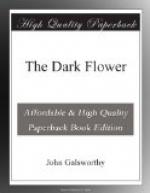Then he saw that they were out in Piccadilly. How far dared he go with her along the railings before he said good-bye? A man was coming towards them, just where he had met Dromore that first fatal afternoon nine months ago; a man with a slight lurch in his walk and a tall, shining hat a little on one side. But thank Heaven!— it was not Dromore—only one somewhat like him, who in passing stared sphinx-like at Nell. And Lennan said:
“You must go home now, child; we mustn’t be seen together.”
For a moment he thought she was going to break down, refuse to leave him. Then she threw up her head, and for a second stood like that, quite motionless, looking in his face. Suddenly stripping off her glove, she thrust her warm, clinging hand into his. Her lips smiled faintly, tears stood in her eyes; then she drew her hand away and plunged into the traffic. He saw her turn the corner of her street and disappear. And with the warmth of that passionate little hand still stinging his palm, he almost ran towards Hyde Park.
Taking no heed of direction, he launched himself into its dark space, deserted in this cold, homeless wind, that had little sound and no scent, travelling its remorseless road under the grey-black sky.
The dark firmament and keen cold air suited one who had little need of aids to emotion—one who had, indeed, but the single wish to get rid, if he only could, of the terrible sensation in his head, that bruised, battered, imprisoned feeling of a man who paces his cell— never, never to get out at either end. Without thought or intention he drove his legs along; not running, because he knew that he would have to stop the sooner. Alas! what more comic spectacle for the eyes of a good citizen than this married man of middle age, striding for hours over those dry, dark, empty pastures—hunted by passion and by pity, so that he knew not even whether he had dined! But no good citizen was abroad of an autumn night in a bitter easterly wind. The trees were the sole witnesses of this grim exercise—the trees, resigning to the cold blast their crinkled leaves that fluttered past him, just a little lighter than the darkness. Here and there his feet rustled in the drifts, waiting their turn to serve the little bonfires, whose scent still clung in the air. A desperate walk, in this heart of London—round and round, up and down, hour after hour, keeping always in the dark; not a star in the sky, not a human being spoken to or even clearly seen, not a bird or beast; just the gleam of the lights far away, and the hoarse muttering of the traffic! A walk as lonely as the voyage of the human soul is lonely from birth to death with nothing to guide it but the flickering glow from its own frail spirit lighted it knows not where. . . .
And, so tired that he could hardly move his legs, but free at last of that awful feeling in his head—free for the first time for days and days—Lennan came out of the Park at the gate where he had gone in, and walked towards his home, certain that tonight, one way or the other, it would be decided. . . .




